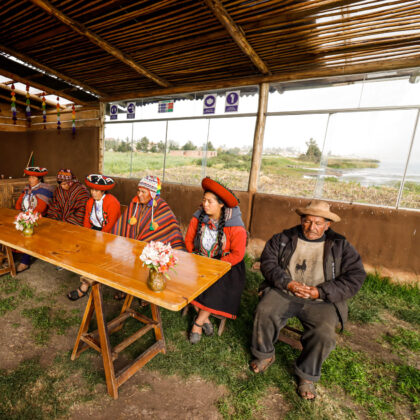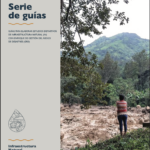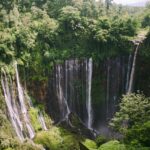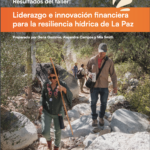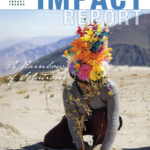The Natural Infrastructure for Water Security (NIWS) project aimed to scale up investments in natural infrastructure in Peru to safeguard water supplies and increase resilience to natural disasters and other risks. It was funded and supported by the United States Agency for International Development (USAID) and the Government of Canada until its termination on February 26, 2025.
Peru is a key partner of the US in receiving Venezuelan refugees, reducing migration pressures into the US. Additionally, key exports from Peru to the US include minerals and metals, agricultural products, and textiles and apparel. All are industries highly vulnerable to water risk.
Peruvians are no strangers to water insecurity. National states of emergency declared in recent years due to drought, fires, floods, and landslides have become increasingly frequent, costing billions of dollars in damages and lost earnings—and impacting millions of lives. During the last 50 years, the country has lost more than half of its glaciers, historically a key source of water.
Natural infrastructure, like forests and wetlands, increase resilience of both upstream communities and downstream water users to these risks. In the last 10 years, Peruvian policymakers across multiple sectors have recognized the opportunity to harness market-based approaches to invest in nature as an asset for managing water risks and have implemented a series of policy reforms and new financial commitments to enable a new approach for nature-based solutions for water in Peru. However, implementing that vision has encountered a series of barriers, from the lack of shovel-ready projects to gaps in knowledge, capacities, and tools to manage and sustainably deploy investments in natural infrastructure.
The Natural Infrastructure for Water Security (NIWS) project was specifically working to address those barriers and scale-up efforts to protect and restore natural water infrastructure in Peru.
By pushing Peru to move beyond concrete-and-steel water infrastructure projects and embrace an expansive new vision of 21st century water infrastructure that also prioritizes protection of vulnerable natural ecosystems through partnerships with upstream, rural communities, NIWS advocated for a holistic, localized approach to managing water risks in an era of increasing variability.
NIWS also worked to ensure that men and women in the communities where these projects were implemented participated fully in the development and implementation of these investments, creating tangible benefits in their day-to-day lives, securing the buy-in of local people to sustain investments, and delivering water security improvements to men, women, and families over time.
Forest Trends led implementation of NIWS in a coalition with our partners CONDESAN, the Peruvian Society of Environmental Law (SPDA), and researchers from Imperial College London.
[Keep Reading] [NIWS website in Spanish]Our Approach
Strengthening Capacity to Ensure Water Security through Natural Infrastructure across Sectors and Levels
We worked closely with Peruvian institutions and actors, from ministries to local water utilities to private communities and local communities, to improve capacity and coordination for natural infrastructure governance. We worked at the national and watershed levels to create powerful coalitions and address policy bottlenecks to scale-up investments that will deliver tangible water security benefits. We also strengthened capacities and performance of critical segments of the system supporting natural infrastructure governance: local populations, including women; NI project developers, implementers, and managers; and generators and managers of information, knowledge, and tools. We were similarly building capacities of our local partners to access and manage donor funds.
Support Peruvian Actors to Design, Finance, and Implement Effective and Durable Investments in Natural Infrastructure
We developed and helped to mobilize portfolios of investments in natural water infrastructure from a range of public and private sources, including Peru’s National Infrastructure Authority’s portfolio on natural disaster risk mitigation and reconstruction, regional and local governments, water utilities, and private companies. In doing so, we aimed to generate new locally grounded experience and skills across the water sector and to advance the tools and mechanisms available to effectively and sustainably invest in water natural infrastructure. We also strengthened monitoring efforts that accompany natural infrastructure interventions, to build a stronger evidence base on the impacts natural infrastructure can have on water management and local communities.
Strengthening Women’s Participation in Water and Natural Infrastructure Management
Our work focused on strengthening the participation of women to ensure that natural infrastructure investment and water management benefitted from their skills, talents, and knowledge—working for women and families. We partnered with leading authorities in the water, environmental, and women’s empowerment sectors in Peru to reform water management and natural infrastructure investments. We also worked directly with women leaders in local organizations and public authorities to highlight and strengthen their skills as leaders in the sector.
Key Results
- Journey Towards Water Security summarizes the key results to date for the NIWS project (as of September 2023)
- Facilitated the approval and implementation of the first watershed investment by SEDAPAL, Lima’s water utility
- Built a portfolio of over $370 million in NI investments in development: over 80 projects developed with over 240 communities in 14 Peruvian regions, $39 million of which have already been mobilized.
- Increased credibility and clarity for decision-makers regarding the water benefits of natural infrastructure interventions through scientific research, publication in prestigious peer reviewed journals, and accessibly sharing this with decision-makers.
- Strengthened capacities of more than 7,100 professionals from national and subnational governments, water companies and civil society to design, monitor and manage natural infrastructure projects
- Developed a suite of over 30 innovative tools to guide the identification, design, and management of effective, equitable, and sustainable interventions in natural infrastructure. Over 700 people from diverse public and private institutions report using information disseminated by the NIWS project, especially HIRO and CUBHIC.
- Strengthened the capacity of institutions to develop and implement natural infrastructure projects, such as the 73% reduction in the time between idea and approval for these projects by Lima’s water supply company.
- Trained and connected more than 100 women leaders through the Women in Water Management Leadership Program.
- Developed and secured regulatory changes that accelerate investments in natural infrastructure and strengthen multi-sectoral water management, working closely with our partners MINAM, ANA, SUNASS, and water companies.
- Documented peat extraction for commercial purposes, which informed MINAM’s approval of a new Supreme Decree for the protection of wetlands.
Key Resources
Key resources for practitioners in Spanish:
- State of Finance for Natural Infrastructure for Water Security in Peru, 2021
- Series of systematic reviews of the scientific literature on the impacts of natural infrastructure interventions on water and soil in the Andean context:
- Contribuciones potenciales de la infraestructura preincaica de infiltración de agua para la seguridad hídrica en los Andes
- Impactos de la forestación en el agua y los suelos de Los Andes: ¿Qué sabemos?
- Impactos del uso del suelo sobre la respuesta hidrológica de cuencas andinas
- Impactos de las zanjas de infiltración en el agua y los suelos: ¿Qué sabemos?
- Impactos de andenes y terrazas en el agua y los suelos: ¿Qué sabemos?
- Infraestructura natural para la gestión de riesgos de erosión e inundaciones en los Andes: ¿Qué sabemos?
- Servicios ecosistémicos hídricos de los pajonales altoandinos: ¿Qué sabemos?
- Events
- Resource Catalog
- Webinars and Videos
- Media Coverage
- Image Gallery
Support and Funding
The Natural Infrastructure for Water Security (NIWS) project was funded by USAID and the Government of Canada. It was implemented by Forest Trends with our consortium partners CONDESAN, the Peruvian Society for Environmental Law (SPDA), and experts from Imperial College London.

This web page was made possible by the support of the American People through the United States Agency for International Development (USAID) and the Government of Canada. The contents of this web page are the sole responsibility of Forest Trends and do not necessarily reflect the views of USAID or the United States Government or the Government of Canada.

